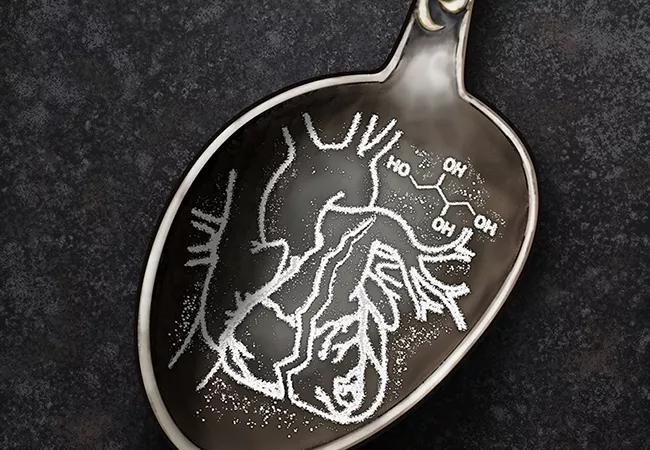Study authors urge reevaluation of the sweetener’s safety designation by food regulators

Image content: This image is available to view online.
View image online (https://assets.clevelandclinic.org/transform/142b9ff9-540f-409f-a655-b73e1be11da2/23-HVI-3555160-erythritol-artificial-sweetener_650x450_jpg)
chemical structure of erythritol drawn in a teaspoon
Ingesting the non-nutritive sweetener erythritol — at a dose typically contained in a “sugarless” soda or muffin — rapidly enhances platelet reactivity in human blood and thereby increases thrombosis potential. This finding, from a new intervention study in healthy volunteers, adds to increasing evidence that this sugar alcohol may not be as safe as currently classified by food regulatory agencies and should be reevaluated as an ingredient.
Advertisement
Cleveland Clinic is a non-profit academic medical center. Advertising on our site helps support our mission. We do not endorse non-Cleveland Clinic products or services. Policy
The study, reported in Arteriosclerosis, Thrombosis and Vascular Biology, was conducted by a team of Cleveland Clinic researchers as part of a series of investigations on the physiological effects of commonly consumed sugar substitutes.
“Many professional societies and clinicians routinely recommend that people at high cardiovascular risk — those with obesity, diabetes or metabolic syndrome — consume foods that contain sugar substitutes rather than sugar,” says senior and corresponding author Stanley Hazen, MD, PhD, Chair of Cardiovascular and Metabolic Sciences in Cleveland Clinic Lerner Research Institute and Co-Section Head of Preventive Cardiology. “It is incumbent upon us to ensure that we are not unwittingly provoking adverse events with this advice.”
Erythritol is classified by the U.S. FDA and the European Food Safety Authority as a GRAS (“generally recognized as safe”) ingredient, allowing its use without restriction in food products. This is primarily because it is a sugar alcohol found naturally in fruits and vegetables and a byproduct of glucose metabolism in human tissue, albeit in very small quantities.
Many people consume processed foods and beverages with erythritol added as a sweetener because they believe these products are healthier than sodas or baked goods containing sugar. However, observational cohort studies, as well as recent mechanistic investigations by Dr. Hazen’s group, have detected signals that erythritol in typically consumed amounts may increase cardiovascular risk.
Advertisement
The group’s previous human and animal investigations of erythritol were published in Nature Medicine (2023;29:710-718) and revealed the following:
“All indicators suggested that higher erythritol levels increase thrombosis risk,” summarizes Dr. Hazen, who led the research.
The current prospective intervention study was designed to more directly observe the effects on platelets in humans following erythritol ingestion. After blood was drawn following an overnight fast, 20 healthy volunteers consumed water mixed with either 30 g erythritol (comparable to the dose in an artificially sweetened soda or baked good) or 30 g of glucose (n = 10 per group; mean age of 30 years in each group). Blood was drawn again after 30 minutes, and plasma levels of erythritol were assessed, as were multiple indicators of platelet function (i.e., analyses by aggregometry with different agonists and quantification of alpha and dense granule marker release).
Key findings included the following:
Advertisement
“This research raises some concerns that a standard serving of an erythritol-sweetened food or beverage may acutely stimulate a direct prothrombotic effect,” says study co-author W. H. Wilson Tang, MD, Research Director for Heart Failure and Cardiac Transplantation Medicine at Cleveland Clinic. “Erythritol and other sugar alcohols commonly used as sugar substitutes should be evaluated for potential long-term health effects, especially when such effects are not seen with glucose itself.”
He adds that the results of this erythritol intervention study are especially notable because they come on the heels of another study by this research group showing that ingestion of a solution containing 30 g of xylitol — another sugar alcohol used to sweeten food and beverages — produced similar increases in plasma levels and similar acute effects on platelet aggregation in healthy volunteers (Eur Heart J. Epub 2024 Jun 6). Similar to current evidence with erythritol, the investigations with xylitol also included large-scale clinical observation studies showing that elevation in plasma xylitol levels is associated with increased risk for heart attack, stroke or death over three years of follow-up.
Drs. Tang and Hazen urge that further prospective clinical studies be conducted to test the cardiovascular safety of these sugar alcohols when used as sugar substitutes, considering their widespread consumption by high-risk individuals. In the meantime, they urge their patients to completely avoid highly processed “sugar free” foods.
Advertisement
“I feel that choosing sugar-sweetened treats occasionally and in small amounts would be preferable to consuming drinks and foods sweetened with these sugar alcohols, especially for people at elevated risk of thrombosis, such as those with heart disease, diabetes or metabolic syndrome,” Dr. Hazen advises.
Advertisement
Advertisement
Studies reveal increased cardiac events, enhanced platelet reactivity and thrombotic potential
Human and animal studies show a rise in platelet reactivity, thrombosis and cardiac events
Phase 3 TANDEM study may help pave way to first approval of a CETP inhibitor
Yet 21.4% of tested individuals had Lp(a) elevation
Phase 2 trial of zerlasiran yields first demonstration of longer effect with each dose of an siRNA
Tech-assisted self-selection concurred with clinician-assessed eligibility in >90% of cases
Newly identified pathway may explain the so-called niacin paradox
It's time to increase testing for this major cardiovascular risk factor in advance of new therapies